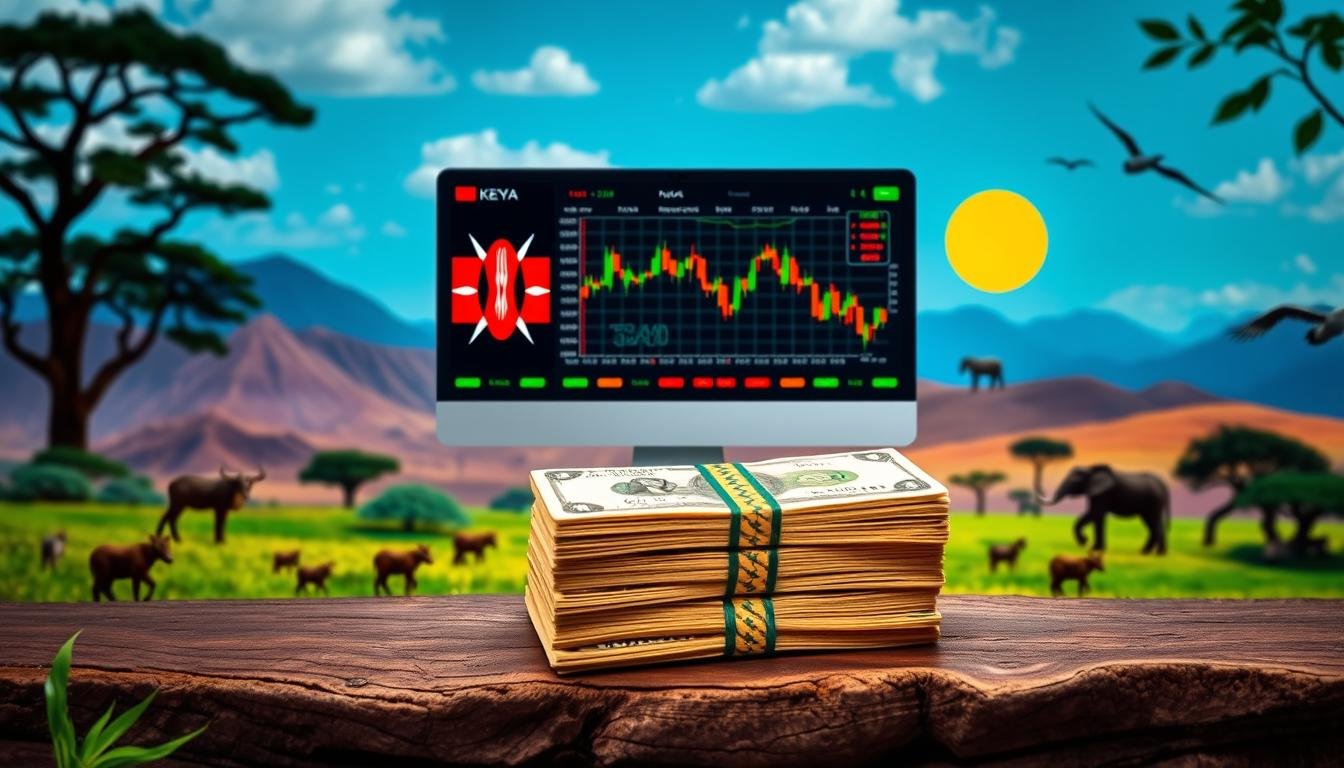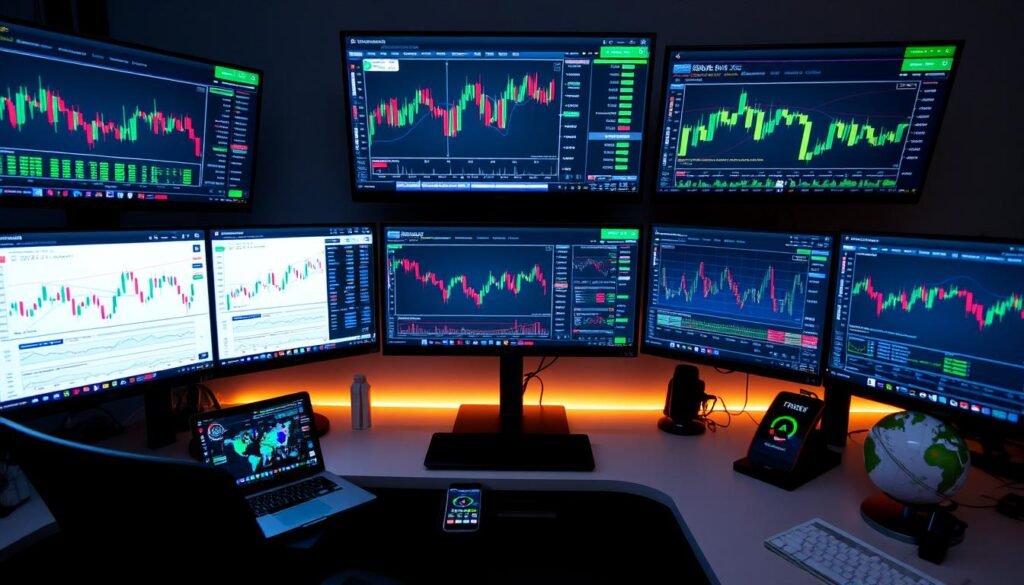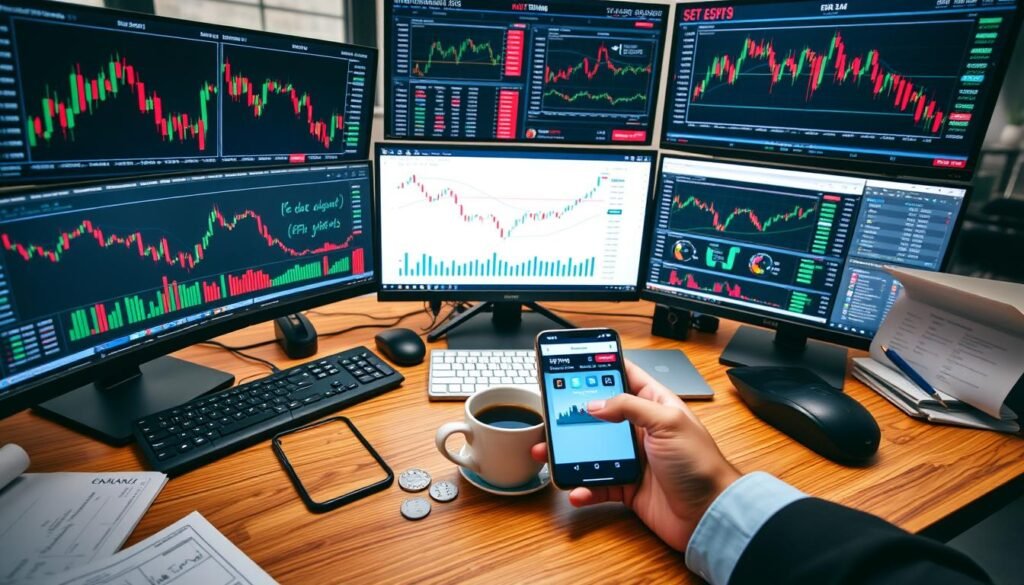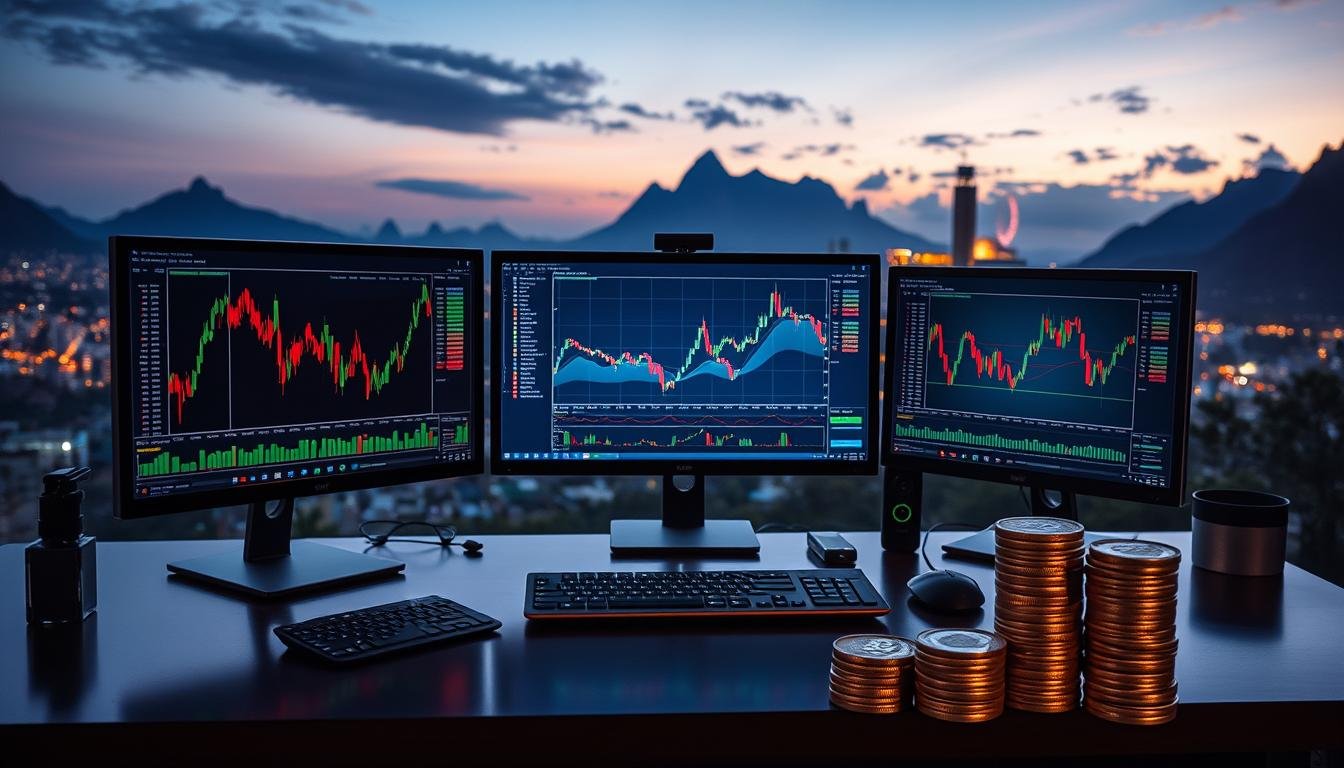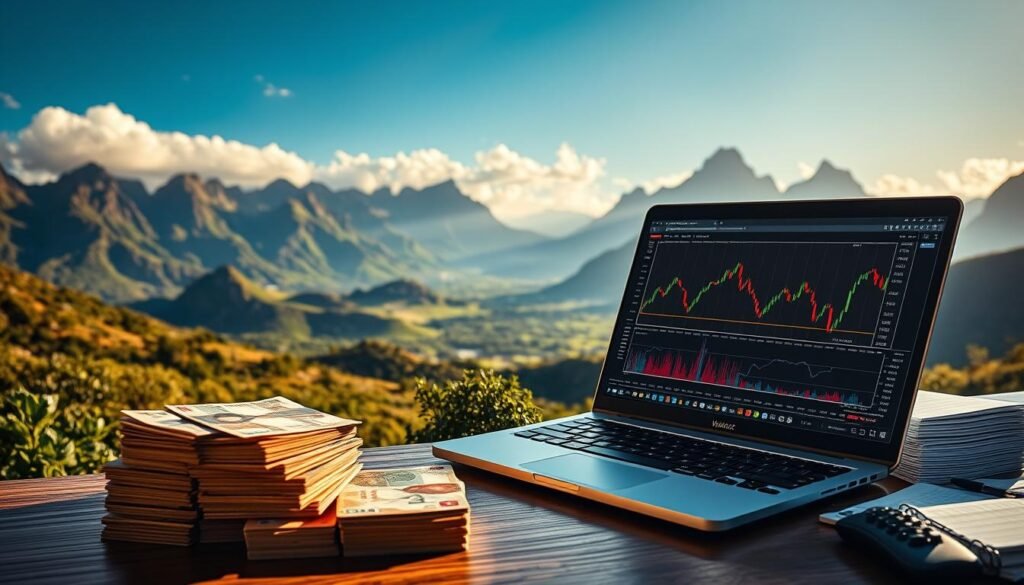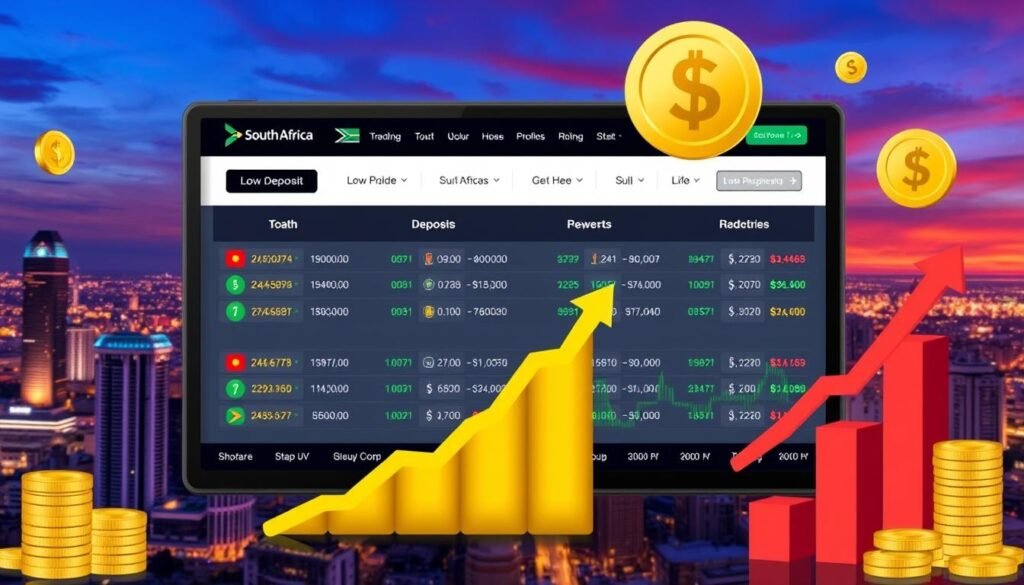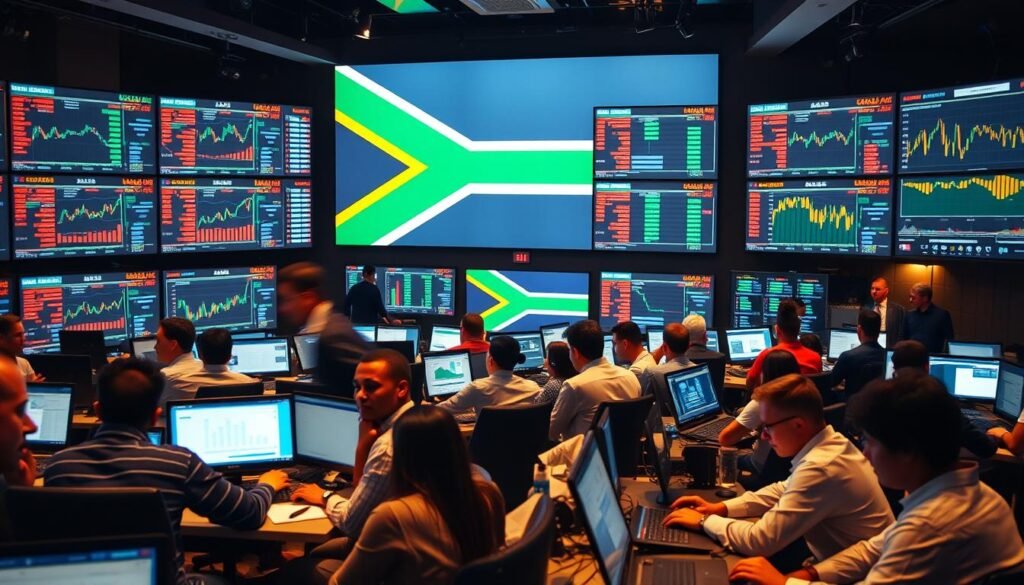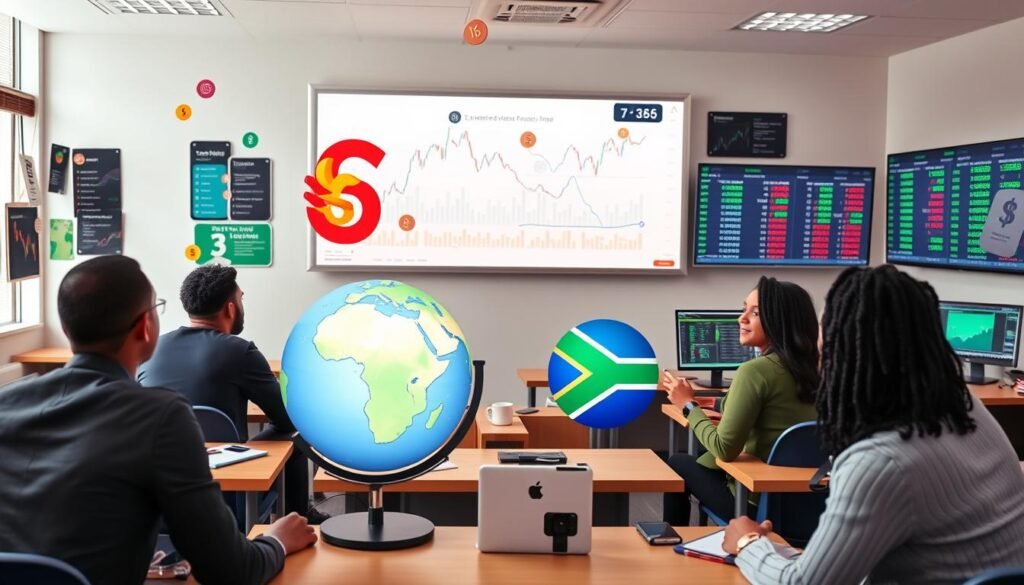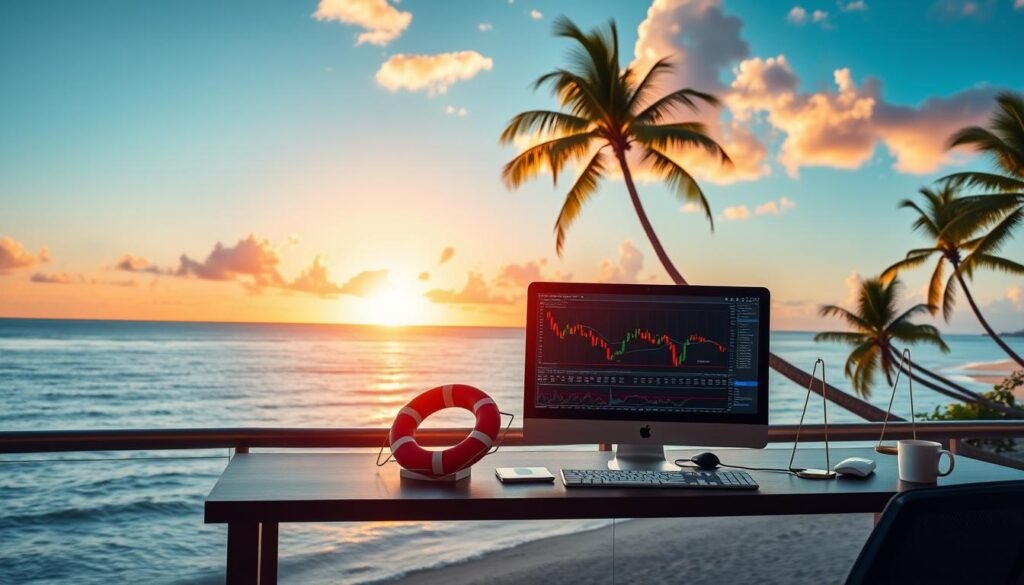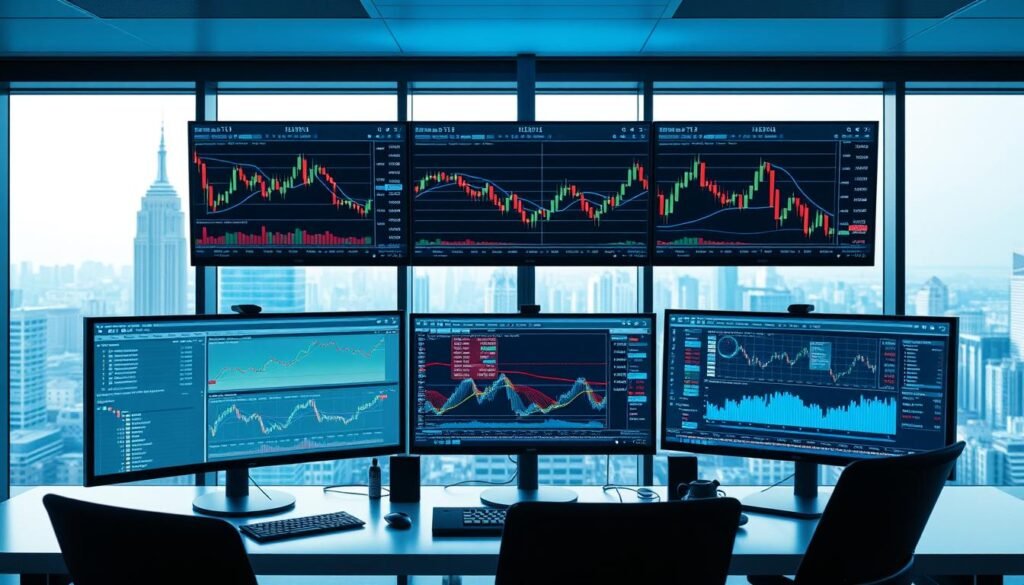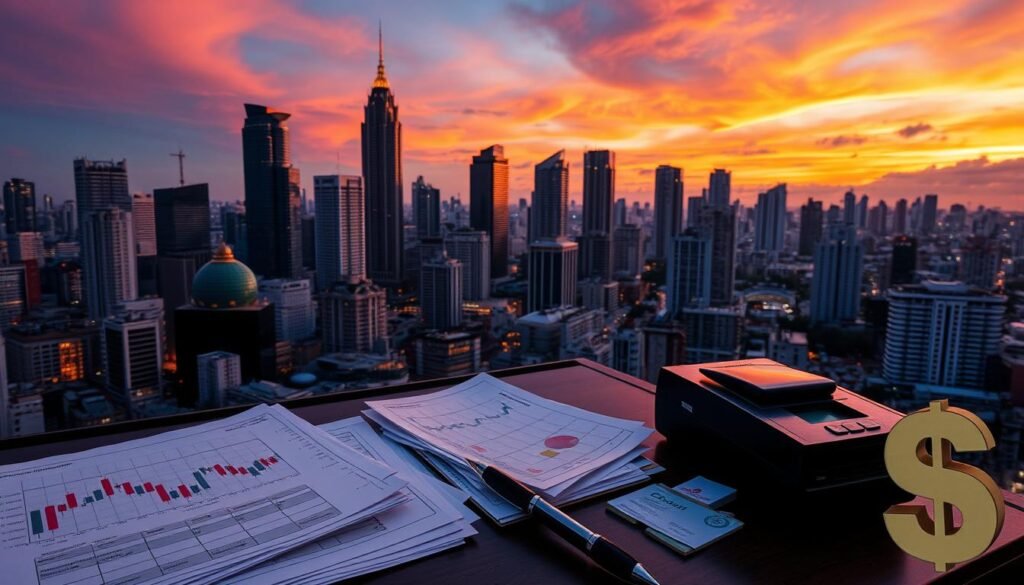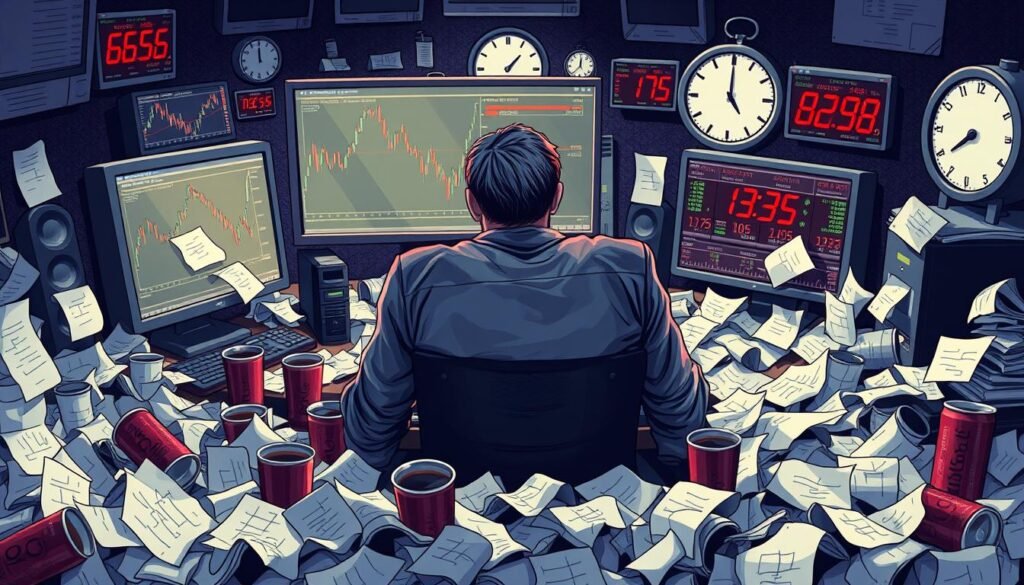Pepperstone Kenya: Your Trusted Forex Broker
Welcome to Pepperstone Kenya, a top forex broker in Kenya. We are known for being a reliable partner for traders in the currency market. Our commitment to top-notch trading services, cutting-edge technology, and strong support makes us the first choice for traders in Kenya.
Key Takeaways
- Pepperstone Kenya is a leading forex broker trusted by Kenyan traders.
- The broker offers a reliable and secure platform for currency trading.
- Pepperstone Kenya provides advanced trading technologies and exceptional support.
- The broker is a trusted choice for both experienced and aspiring traders in the region.
- Pepperstone Kenya’s focus on providing exceptional services makes it a top choice for Kenyan traders.
What is Pepperstone?
Pepperstone is a well-known global what is pepperstone and CFD broker. It has been helping traders all over the world since 2010. As a top name in the financial world, Pepperstone gives Kenyan traders a wide range of pepperstone forex services and pepperstone trading services.
They offer access to many currency pairs, commodities, indices, and more. This lets traders explore different financial options.
Overview of Pepperstone’s Forex Trading Services
Pepperstone’s main service is its strong forex trading platform. It’s designed for traders of all levels. Kenyan traders can choose from a big list of currency pairs and use leverage to increase their positions.
They can also trade quickly thanks to fast execution speeds. Pepperstone provides tools like market analysis, real-time prices, and customizable charts. These tools help traders make smart choices and find good opportunities in the market.
| Forex Trading Services | Key Features |
|---|---|
| Currency Pairs | Over 60 major, minor, and exotic currency pairs |
| Leverage | Up to 1:500 leverage for experienced traders |
| Execution Speeds | Tight spreads and lightning-fast execution |
| Trading Tools | Advanced charting, market analysis, and real-time price feeds |
By working with Pepperstone, Kenyan traders get into a strong and flexible trading world. This world helps them confidently and accurately move through the fast-changing forex markets.
Why Choose Pepperstone Kenya?
Pepperstone is a top choice for forex trading in Kenya. It’s known for its competitive spreads, low commissions, and strong regulatory framework. Plus, it offers advanced trading platforms.
Choosing Pepperstone Kenya means getting a secure and easy-to-use trading experience. The broker follows strict rules to keep your money and personal info safe.
- Pepperstone Kenya has competitive spreads and low commissions, helping you make more money.
- Its trading platforms, like MetaTrader 4 and 5, come with many tools and features for better trading decisions.
- With global presence and local expertise, you get personal support and advice that fits your needs.
Choosing Pepperstone in Kenya means a smooth and rewarding trading journey. The broker is all about being open, innovative, and focused on customer happiness. It’s a great choice for Kenyan traders.
“Pepperstone has been a game-changer for my forex trading in Kenya. The platform’s stability, advanced features, and exceptional customer support have been instrumental in my success.”
– James Mwangi, Kenyan Trader
| Feature | Benefit |
|---|---|
| Competitive Spreads and Low Commissions | Maximize your trading profits with Pepperstone’s cost-effective pricing structure. |
| Advanced Trading Platforms | Access a wide range of tools and features to enhance your trading experience. |
| Robust Regulatory Framework | Trade with confidence, knowing your funds and personal information are secure. |
| Global Presence, Local Expertise | Benefit from Pepperstone’s international reach and deep understanding of the Kenyan market. |
In conclusion, choosing Pepperstone Kenya as your forex broker is a smart move. It offers many benefits tailored to Kenyan traders. With its focus on excellence, Pepperstone ensures a rewarding and secure trading experience in the region.
Pepperstone’s Competitive Edge
Pepperstone stands out with its top-notch trading platforms and tools. These are designed to help Kenyan traders succeed. They offer MetaTrader 4, MetaTrader 5, and cTrader, making trading easy and intuitive for all.
Advanced Trading Platforms and Tools
Pepperstone’s platforms have advanced charting features. This lets traders dive into market analysis and make smart choices. They also come with tools for risk management, helping traders feel confident in the Pepperstone competitive edge forex market.
“Pepperstone’s trading platforms are truly remarkable. The level of customization and the sheer breadth of tools available have been instrumental in shaping my trading strategy.”
Pepperstone also offers a range of Pepperstone trading tools. These include automated trading solutions and educational resources. This support helps Kenyan clients succeed in the forex market.
- Cutting-edge MetaTrader 4, MetaTrader 5, and cTrader platforms
- Advanced charting capabilities for in-depth market analysis
- Comprehensive analytical and risk management tools
- Automated trading solutions for seamless execution
- Extensive market research and educational resources
Pepperstone’s advanced Pepperstone trading platforms and tools make it a top choice for Kenyan traders. It meets the changing needs of traders with its Pepperstone competitive edge.
Pepperstone Kenya: A Reputable Broker
Pepperstone is known as a reliable and trustworthy broker in Kenya. It has been excellent for ten years. The company is known for its honest and clear practices.
Pepperstone is regulated by top financial bodies like the ASIC and FCA. This means client money is safe. Kenyan traders trust Pepperstone because of this.
Trust is key in the forex market. Pepperstone’s pepperstone kenya reputation, pepperstone kenya credibility, and history as a reputable broker make it a top choice. Kenyan traders know they can count on Pepperstone for a safe and rewarding trading experience.
“Pepperstone has consistently demonstrated its dedication to providing a reliable and trustworthy trading environment for Kenyan investors. Their regulatory compliance and reputation for excellence are truly impressive.”
Pepperstone puts clients first and follows the highest standards of integrity. It is a reliable partner for Kenyan forex traders looking for a secure and reputable platform.
| Regulation | Client Funds Safety | Transparency |
|---|---|---|
| Regulated by top-tier authorities like ASIC and FCA | Strict compliance ensures client funds are safeguarded | Commitment to ethical and transparent practices |
Kenyan traders can be sure is pepperstone a reputable broker. Pepperstone’s reputation for excellence is well-earned. It has a strong regulatory framework, safe client funds, and clear operations. Pepperstone is a trusted partner in the Kenyan forex market.
Tight Spreads and Low Commissions
Pepperstone Kenya is a top choice for traders in Kenya. It offers pepperstone spreads and low commissions. This helps traders make more money and improve their strategies.
Cost-Effective Trading with Pepperstone
Pepperstone is known for fair prices and transparency. It has some of the tightest spreads, helping traders keep more of their profits. Plus, its low commissions make trading even more affordable for everyone.
| Trading Instrument | Pepperstone Spreads | Pepperstone Commissions |
|---|---|---|
| EUR/USD | 0.1 pips | $0.50 per lot |
| GBP/USD | 0.3 pips | $0.70 per lot |
| USD/JPY | 0.2 pips | $0.60 per lot |
Pepperstone Kenya combines tight pepperstone spreads and low pepperstone commissions. This makes trading affordable for Kenyan traders. It helps them earn more and explore more trading opportunities.
Diverse Account Options for All Traders
At Pepperstone Kenya, we know every trader is different. That’s why we have a wide range of pepperstone account types and pepperstone trading accounts. These options meet the needs of traders in Kenya.
Are you new to forex trading or an experienced trader? Pepperstone has the right pepperstone account options for you.
Tailored Accounts for All Traders
Our pepperstone account types include:
- Standard Accounts: Great for beginners or those with less capital.
- Islamic Accounts: Follow Sharia law, with no swaps.
- Professional Accounts: For advanced traders who need extra tools.
Pepperstone Kenya has a pepperstone trading account for everyone. No matter your trading style or risk level, we help you reach your financial goals.
| Account Type | Minimum Deposit | Leverage | Spread |
|---|---|---|---|
| Standard | $100 | Up to 1:500 | From 0.0 pips |
| Islamic | $100 | Up to 1:500 | From 0.0 pips |
| Professional | $200 | Up to 1:500 | From 0.0 pips |
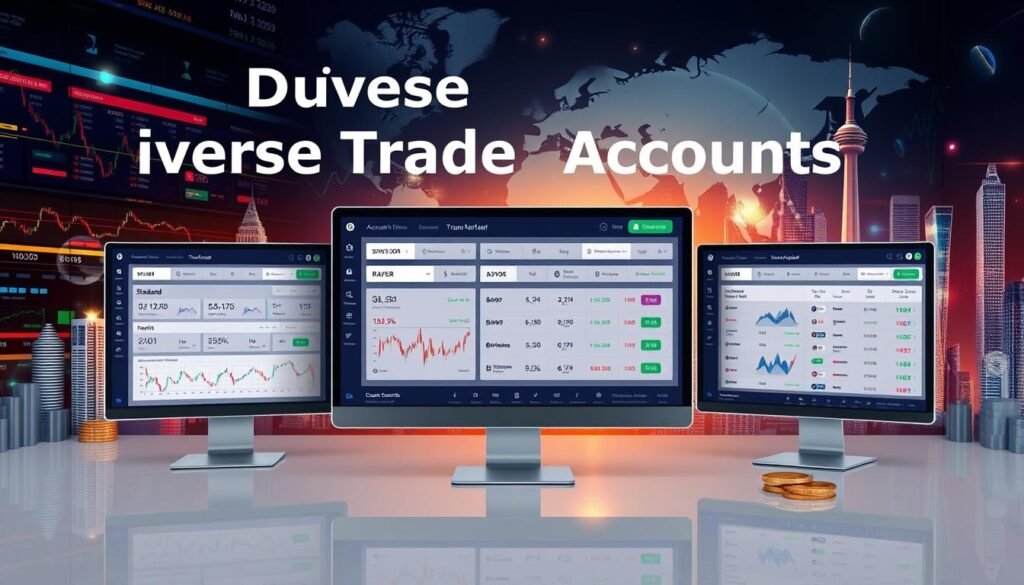
Find the pepperstone account options that fit your trading goals. Start your journey to financial success with Pepperstone Kenya.
Robust Security and Regulatory Compliance
At Pepperstone Kenya, we put your safety first. We are a pepperstone-regulated broker. This means we follow strict rules to protect your money and personal info. Our pepperstone-security measures let Kenyan traders trade with confidence.
Safeguarding Your Trades
Pepperstone Kenya is watched over by top financial bodies, like the Capital Markets Authority (CMA) of Kenya. This watch ensures we stick to the strictest pepperstone-compliance rules. Your assets and personal data are safe from harm.
- Segregated client accounts to safeguard your funds
- Advanced encryption and data protection technologies
- Comprehensive anti-money laundering (AML) and counter-terrorist financing (CTF) policies
Choosing Pepperstone Kenya means your account and investments are safe. We use top pepperstone-security measures.
| Regulatory Body | Regulation Details |
|---|---|
| Capital Markets Authority (CMA) of Kenya | Pepperstone Kenya is licensed and regulated by the CMA. This ensures we meet the highest financial supervision and consumer protection standards. |
Pepperstone’s dedication to pepperstone-regulation and pepperstone-compliance gives Kenyan traders peace of mind. They can focus on their trading and reach their financial goals.
Comprehensive Educational Resources
At Pepperstone Kenya, we think giving traders knowledge is key to their success. That’s why we have a wide range of pepperstone educational resources. These are designed to help Kenyan traders improve their skills and make better trading choices.
Our pepperstone trading education includes webinars, e-books, and trading guides. These pepperstone learning materials cover many topics. From basic analysis to risk management, we ensure our clients have what they need to succeed.
Whether you’re new to forex trading or looking to improve, our resources are for you. Explore our library of market insights and analysis. Let us guide you on your path to trading mastery.
“The more you learn, the more you earn.”
At Pepperstone Kenya, we’re dedicated to giving our clients the knowledge they need to succeed. Check out our pepperstone educational resources today. Start your journey to becoming a skilled forex trader.
Exceptional Customer Support
At Pepperstone Kenya, we know that great customer support is key for a smooth trading experience. Our team is ready 24/7 to help Kenyan traders with any questions or problems. This way, they can trade with confidence and ease.
Dedicated Assistance for Kenyan Traders
Kenyan traders at Pepperstone can count on our quick and knowledgeable support team. We offer personalized help for setting up accounts, making trades, or understanding market trends. Our goal is to help Kenyan traders succeed by providing pepperstone customer support, pepperstone trader support, and pepperstone kenya support that’s unmatched.
“The Pepperstone team has been invaluable in my forex trading journey. Their prompt and thorough assistance has helped me overcome various challenges and reach new heights in my trading success.”
– John Mwangi, Pepperstone Kenyan Trader
We’re proud of our customer support at Pepperstone Kenya. We make sure our clients feel heard, understood, and supported. Our commitment to excellence is shown in the positive feedback from our Kenyan traders, who appreciate our dedication to their success.
| Pepperstone Customer Support Highlights | Key Benefits for Kenyan Traders |
|---|---|
|
|
See how Pepperstone’s customer support can change your trading journey in Kenya. Contact our team today and experience the unmatched care and expertise that makes us a top forex broker in Kenya.
Global Presence, Local Expertise
Pepperstone is a top global forex broker. It has a strong international presence across many continents. This global reach helps the company offer tailored solutions for Kenyan traders.
But Pepperstone’s success also comes from knowing the local Kenyan market well. It provides culturally relevant support and educational resources. This makes trading more suitable for Kenyan traders’ needs.
Pepperstone’s local expertise in Kenya comes from understanding the local financial landscape. It has a team of experts who know the local regulations and market dynamics. This knowledge helps Pepperstone offer a more personalized service to Kenyan traders.
Pepperstone combines its global reach with local expertise to be a trusted partner for Kenyan traders. Its international presence gives access to many trading tools and market insights. At the same time, its local knowledge ensures these resources meet Kenyan traders’ unique needs.
“Pepperstone’s global presence and local expertise have been instrumental in my forex trading journey. The company’s ability to cater to the specific needs of Kenyan traders has been a game-changer for me.”
–John Okoth, Kenyan Forex Trader
Pepperstone’s Mobile Trading App
At Pepperstone, we know how crucial it is to stay in touch with your trades, anywhere. That’s why we’ve created a top-notch pepperstone mobile app. It lets Kenyan traders access their trading platforms and manage their accounts easily, on the move.
The pepperstone trading app gives you smooth access to our advanced trading tools. You can watch market trends, make trades, and keep track of your financial goals, even when you’re pepperstone on-the-go trading. This mobile solution helps you grab market chances and react quickly, so you never miss out.
Stay Connected with Your Trades
Our mobile app is made for today’s traders, with a simple design and easy-to-use interface. Whether you’re on your way to work, traveling, or just out and about, you can easily check your trading accounts. You can also see real-time market data and make smart choices with just your hand.
- Stay current with the latest market trends and news
- Get push notifications for important market updates and alerts
- Make trades and manage your portfolio easily, wherever you are
- Keep an eye on your account balances, deposits, and withdrawals
With the pepperstone mobile app, your trading experience will improve. You’ll always be connected to the markets and in charge of your financial future.
“The Pepperstone mobile app has been a game-changer for my trading. I can stay on top of the markets and react to opportunities no matter where I am. It’s a must-have for any trader who values flexibility and responsiveness.”
– John Doe, Kenyan Trader
Success Stories from Pepperstone Clients
At Pepperstone, we’re proud of the success stories from our Kenyan clients. These stories show how partnering with us can change lives. They prove that choosing a reliable forex broker like Pepperstone is a smart move.
Our clients range from new traders to seasoned pros. They’ve all seen their financial goals come true thanks to our platform and services.
“Pepperstone has been a game-changer for my trading journey. The advanced tools and personalized support provided by the team have been instrumental in helping me achieve consistent profits in the forex market.”
– John Mburu, Pepperstone Kenya Client
Mary Wanjiku, another Kenyan trader, had this to say:
“I was hesitant to start trading forex, but Pepperstone’s user-friendly platform and comprehensive educational resources made the process seamless. Now, I’m able to manage my trades effectively and take my financial goals to new heights.”
These pepperstone client testimonials and pepperstone trader success stories from pepperstone kenya client experiences prove our services are top-notch. They show our dedication to helping our clients succeed in Kenya.

| Client Name | Location | Trading Experience | Pepperstone’s Impact |
|---|---|---|---|
| John Mburu | Nairobi, Kenya | Intermediate | Achieved consistent profits, leveraged advanced trading tools |
| Mary Wanjiku | Mombasa, Kenya | Beginner | Seamless trading experience, mastered forex trading with Pepperstone’s guidance |
| Fatima Ali | Kisumu, Kenya | Professional | Expanded trading portfolio, benefited from Pepperstone’s global expertise |
These success stories from Pepperstone’s Kenyan clients show our big impact. We offer a strong trading platform, personal support, and help reach financial goals. This makes us the go-to choice for traders in Kenya.
Getting Started with Pepperstone Kenya
Opening a Pepperstone Kenya trading account is easy and quick. Kenyan traders can fill out the online application and provide the needed documents. They can then start trading with Pepperstone Kenya right away. The company’s platform is easy to use, and their support team is always there to help. This makes it simple for traders to dive into the forex market.
Simple Account Opening Process
To open a pepperstone account, follow these steps:
- Go to the Pepperstone Kenya website and click “Open an Account”.
- Pick the account type that fits your trading style.
- Fill out the online form with your personal and financial details.
- Upload your ID, passport, and proof of address.
- Submit your application, and Pepperstone will review it fast.
- After approval, fund your account and begin trading with Pepperstone.
The pepperstone account opening process is made simple. It lets Kenyan traders how to open a pepperstone account easily and confidently.
“Pepperstone made the account opening process seamless and hassle-free. I was able to start trading in no time and have been very satisfied with their services.”
– Kenyan Trader
Pepperstone is dedicated to great customer service and following rules. Kenyan traders can be sure their trading experience will be safe and reliable.
Celebrating Pepperstone’s Achievements
At Pepperstone, excellence is not just a goal, but a driving force. It has propelled the company to the forefront of the global forex trading industry. The company’s commitment to innovation and delivering exceptional services has earned it many awards.
Pepperstone has been honored with the prestigious “Best Forex Broker” award. This shows its dedication to providing Kenyan traders with a seamless and rewarding trading experience. The company’s state-of-the-art trading platforms have also been recognized as the “Best Trading Platform.”
These pepperstone awards and pepperstone recognition reflect the company’s technical prowess and commitment to empowering Kenyan traders. The pepperstone industry accolades have earned Pepperstone a well-deserved reputation as a leader in the global forex trading landscape. This makes it a preferred choice for Kenyan traders seeking a reliable and reputable broker.
“Pepperstone’s consistent recognition by the industry is a testament to our unwavering commitment to excellence and innovation. We are proud to be a trusted partner for Kenyan traders, and these awards reaffirm our dedication to delivering the highest level of service and support.”
As Pepperstone continues to push the boundaries of what’s possible in the forex trading industry, Kenyan traders can rest assured. They are partnering with a broker that values their success and is committed to providing them with the tools and resources they need to thrive.
Conclusion
Pepperstone Kenya stands out as a top forex broker for Kenyan traders. It offers competitive spreads, advanced trading platforms, strong security, and great customer support. These features help traders feel confident in the fast-paced forex market.
Choosing Pepperstone Kenya means traders get to use the company’s global knowledge and local expertise. This makes it a great choice for those looking for a reliable and trustworthy broker.
Pepperstone Kenya is committed to making trading easy and safe for its clients. Its focus on value adds to its reputation as a leading forex broker in Kenya.
FAQ
What is Pepperstone?
Pepperstone is a well-known global forex and CFD broker. It has been helping traders worldwide since 2010. It offers a wide range of trading services to Kenyan traders, including currency pairs, commodities, and indices.
Why Choose Pepperstone Kenya?
Traders in Kenya choose Pepperstone for its secure and reliable trading experience. It offers competitive spreads, low commissions, and advanced trading platforms. These features meet the unique needs of traders in the region.
What are Pepperstone’s Competitive Advantages?
Pepperstone stands out with its top-notch trading platforms and tools. Kenyan traders get access to MetaTrader 4, MetaTrader 5, and cTrader. These platforms offer a seamless trading experience and advanced features to help traders make informed decisions.
Is Pepperstone a Reputable Broker?
Yes, Pepperstone is a reputable and trustworthy broker in Kenya. It has a decade-long track record of excellence and is regulated by top-tier financial authorities. This ensures the safety and security of client funds.
What are Pepperstone’s Spreads and Commissions?
Pepperstone Kenya offers competitive spreads and low commissions. This makes it a cost-effective choice for traders. Its global scale and expertise allow for tighter spreads and reduced fees, helping traders maximize profits.
What Account Options Does Pepperstone Offer?
Pepperstone Kenya offers a range of account options for different trading styles and risk profiles. Traders can choose from standard, Islamic, and professional accounts to align with their goals and preferences.
How Does Pepperstone Ensure the Safety of Trader Funds?
Pepperstone Kenya prioritizes the safety and security of client funds and personal information. It is regulated by top-tier financial authorities, ensuring compliance and risk management. Traders can trade with confidence, knowing their accounts and assets are protected.
What Educational Resources Does Pepperstone Provide?
Pepperstone Kenya offers a wide range of educational resources. These include webinars, e-books, trading guides, and market analysis. They help traders develop their skills and make informed trading decisions.
How Does Pepperstone Provide Customer Support to Kenyan Traders?
Pepperstone Kenya provides exceptional customer support. Its dedicated team is available 24/7 to assist traders with any inquiries or issues. This ensures a seamless and personalized trading experience.
How Does Pepperstone’s Global Presence Benefit Kenyan Traders?
Pepperstone’s global presence benefits Kenyan traders by offering tailored solutions. It understands the local market well, providing culturally relevant support and educational resources. This ensures a trading experience that meets the unique needs of Kenyan traders.
What Mobile Trading Capabilities Does Pepperstone Offer?
Pepperstone offers a state-of-the-art mobile trading app. It allows traders to stay connected with their trades anytime, anywhere. The app provides seamless access to trading platforms, enabling traders to monitor market movements and execute trades on the go.
What Success Stories Have Pepperstone Clients Shared?
Pepperstone’s success is reflected in the numerous success stories from its clients. From novice traders to experienced professionals, these testimonials highlight the transformative impact of partnering with Pepperstone. They showcase the broker’s dedication to providing a superior trading experience.
How Can Kenyan Traders Get Started with Pepperstone?
Opening a Pepperstone Kenya trading account is easy and hassle-free. Traders can complete the online application and provide necessary documents. The company’s user-friendly platform and dedicated support team ensure a seamless onboarding experience.
What Achievements and Recognitions Has Pepperstone Received?
Pepperstone has received numerous awards and accolades for its excellence and innovation. It has been recognized as “Best Forex Broker” and “Best Trading Platform.” These achievements solidify its reputation as a trusted and respected leader in the global forex trading landscape.

